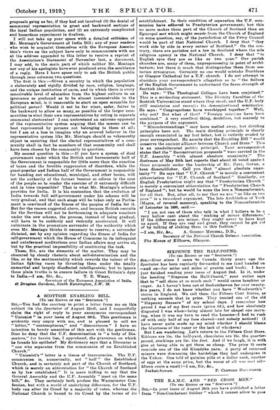A. SCOTTISH ENABLING BILL.
[To THE EDITOR Or THE " SPECTATOR."] SIR,—You had the courtesy to print a letter from me on this subject (in the Spectator of August 23rd), and I respectfully claim the right of reply to your anonymous correspondent " Unionist " in your issue of August 30th. This gentleman is evidently very angry with me, and is pleased to call me " bitter," "contemptuous," and " discourteous." I have no intention to bandy amenities of this sort with the gentleman. Does he deny that the U.F. denomination is " a body of Dis- senters," for herein lies, I apprehend, the gravamen on which he founds his epithets? My dictionary says that a Dissenter is " one who separates from the communion of an Established Church."
" Unionist's " letter is a tissue of inaccuracies. The U.F. communion is, numerically, not " half " the Established Church, and is certainly not part of the Church of Scotland, which is merely an abbreviation for " the Church of Scotland as by law established." It is mere trifling to say that the General Assembly and the U.F. Assembly " meet on the same hill," Jo. They certainly both profess the Westminster Con- fession, bat with a world of underlying difference, for the U.F. body can alter its Creed by a majority of votes, whereas the National Church is bound to its Creed by the terms of its establishment. In their condition of separation the U.F. com- munion have adhered to Presbyterian government; but this no more makes them part of the Church of Scotland than an Episcopal sect which might secede from the Church of England on some question, say, of the jurisdiction of the Privy Council 'would be part of that National Church. I deny that " they work side by side in every corner of Scotland." On the con- trary, there are parishes not a few in Scotland where the sole religious agency is the National Church. I deny that " to English eyes they are as like as two peas." Our pariah churches are, many of them, unprepossessing in point of archi- tecture; but there is much that distinguishes them from seo- tarian synagogues. Certainly no one would mistake Dunblane or Glasgow Cathedral for a U.F. church. I do not attempt to elucidate your correspondent's allegation as to " the failure of the English Government to understand the fierce strength of Scottish idealism."
He says: " The Theological Colleges have been conjoined." This is a misleading statement. The Divinity Faculties of the Scottish Universities stand where they stood; and the U.F. body still maintains and recruits its denominational seminaries. He says: "Congregations have worshipped together." Well, why not? But what of that? " Foreign missions have been combined." A very excellent thing, doubtless, but scarcely to the purpose of the argument.
" Misunderstandings " may have melted away, but dividing principles have not. The main dividing principle is clearly enough enunciated in my last letter, but is entirely evaded by your correspondent. He asserts that the Enabling Bill " would conserve the ancient alliance between Church and State." This is an unadulterated petitio principii. Your correspondent states that the " Reconstruction proposals" were carried in the US. Assembly " with almost absolute unanimity." The Scotsman of May 28th last reports that about 65 voted against those proposals under the leadership of Mr. Barr, Govan, a keen disestablisher. Call you that "almost absolute unan- imity "? He says that " U.F. Church" is merely a convenient abbreviation for "U.F. Church of Scotland." Similarly, an English Presbyterian might say that " Presbyterian Church " is merely a convenient abbreviation for " Presbyterian Church of England "; but he would be none the less a Nonconformist. for all that. But, after all, to say that we are " as like as two peas " is a two-edged argument. The late Archbishop of York (Magee, of revered memory), speaking to the Nonconformists of Leicester in 1880, said " I am not one of those who talk in what I believe to be a very hollow cant about the sinking of minor differences.' If the differences are minor, they ought never to have kept us apart. If they are real and great, they cannot be got rid of by talking of sinking them in this fashion."
—I am, Sir, tic., A. GORDON Mrremuss D.D.,
Secretary of the National Church Defence Association. The Manse of Killearn, Glasgow.


































 Previous page
Previous page